An Afro-Indian Community in Karnataka, India: A Study of Ethnic Identity, its Maintenance and Change
This study is a humble attempt to expose what has been least viewed and underrepresented in anthropological research, namely, the Oriental African Diaspora. My theoretical framework is a diaspora study, which includes aspects of migration, cultural identity, minority-majority relations, the maintenance of group-boundaries and the unavoidable fact of identity change and integration.
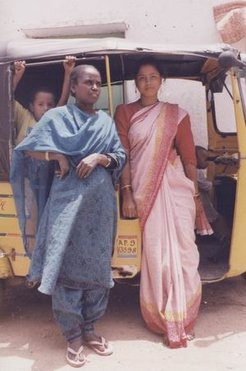
The study of Siddi identity compels one to go back in time and observe the history of Indo-African trade relations. These relations started and facilitated the mass migration of people across the continents, which in turn and in most cases, led to the formation of diaspora enclaves on the other side of each continent. The importance and antiquity of Indian trade with the eastern coasts of Africa in particular, and the cultural consequences thereof, have long been subjects of scholarly discussion and are also in this research project.
Contacts between Ethiopia and India have taken place since the times of the Greco-Roman Empire. Aksum (1st to 8th AD), as one of the strong seafaring kingdoms of its time, had well-established contacts with the Indian sub-continent. India and Aksum have collaborated in supplying the raw materials needed by great empires of the Mediterranean World and Western Asia; like the Persians, Greeks, Romans, Arabs and Turks. As a result of this contact, many Africans, including some Ethiopians, went by their own will, or were taken to Asia, particularly to India. Moreover, as a result of the Ottoman Turks’ control of the Red Sea`s costal areas in the 16th century, which led to continuous Christian versus Muslim conflict in the Horn of Africa, many prisoners of war were sold into slavery by both Christian and Muslim states of Ethiopia mainly into Muslim kingdoms of Asia.
The Indo-African trade relations were not only confined to Aksum and Abyssinia, but the entire region of eastern Africa was involved in it. India has since early times traded with Somalia, Kenya, Mozambique, Malawi, Uganda and the islands of Zanzibar, Kilwa, Pemba. It had also, in the past, traded with South Africa and South Central Africa, not to mention the relative few cases of trade with western Africa. There is enough literature supporting the historic contact between Indian and African merchants since as far as millennia. Contact between Indians and Africans grew substantially since the rise of Islam in the 7th Century, leaped to its climax during the middle ages and continued until the second half of the twentieth century.
As a result, as many Indians settled in East Africa for various reasons, many Africans also had gone and settled in India engaging in various occupations. These African immigrants who are locally known as Siddi or Habshi are now living in various geographical pockets of India, forming their own ethnic enclaves amidst their host society. The Siddi in India are both self ascribed and ascribed by their hosts as such, which implies that they have an ethnic group consciousness despite their assimilation to the host society in several respects. As is the case with all ethnic groups, it is possible to observe the tendencies of both identity maintenance and change.
The principal Siddi communities in India are located in Gujarat, Hyderabad, Karnataka, in the Bombay region and along the western coast, including Goa. I had intended to do my research in Gujarat where the main concentration of Siddi is found, but decided to change my ethnographic focus as there is a continuous religious feud between Moslem and Hindu communities of the area. During my visit to the area, their feud had escalated into ferocious conflict which claimed the lives of many. Some among the victims were foreign nationals. Thus, I have decided to work in Karnataka, where a Siddi community that claims to have come from Sidamo area of Ethiopia has been living for centuries. Presently, Karnataka enjoys relative safety from communal strife as it is also geographically far from Gujarat, the main centre of Moslem versus Hindu conflict. I have good rapport and continuous contact with members of this community.
An Afro-Indian Community in Karnataka, India: A Study of Ethnic Identity, its Maintenance and Change
Another reason to choose this area is that the Siddi of Karnataka are still unknown (and even unheard of) in the academic circle. This community is relatively unique in that, despite its presence in India for hundreds of years, its members have kept their distinctness from their neighbouring host societies in several respects and are the least assimilated Siddis of India. I hope this study will contribute its share, or at least arouse an interest in the academic circle for further inquiry and study of the cultural assets of the Siddi. I would like to study the nature of their ethnic identity, the extent of its maintenance and change, and the factors responsible for these. I shall examine both the physical and cultural boundary maintaining mechanisms. Besides, questions of the following sort shall be posed and addressed: How clear-cut or blurred are these boundaries? Which African cultural elements are still kept and why? What kind of minority versus majority relationships cross-cut these boundaries? How amicable or inimical are their interethnic relationships? Where are the Siddi found in the Indian caste strata? Further, the current arguments and counter-arguments into the theory of ethnicity and diaspora identity shall be debated in this project description.
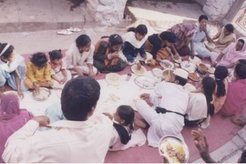
Africans of the Orient and of the Occident have had contrasting experiences in their engagements with their contrasting host societies. As we can learn from historical documents, a considerable proportion of the Siddi, in spite of their original slave status, were raised to high-ranking positions, even at times, to the highest position of authority in some of the Muslim kingdoms of India. How did the Siddi, utilising their ethnic resources, achieve a better position among their hosts whereas the same could not be said of Africans in the western world?
To further clarify this point the following excerpts from two known scholars of history, namely, Rahman and Pankhurst will suffice. “The Shidi (Habshi or Siddi) was received in the Sindi (Indian) society as a unique creature. This ebony skinned, thick-lipped man with a head of extremely curly hair was strange to the Sindis. The feudal lord acquired this creature to amuse himself and adorn his court with” (Rahman 1976: 4). But “like the Turks who founded dynasties throughout the Mohammedan world, these Habshis usually began as slaves, and seem to have shown the same wonderful capacity, as did the Turks, for rising from slavery to the highest position” (Pankhurst 1972: 53).
Although slavery has been outlawed and abolished by almost all known governments since hundreds of years ago, its psychological impact and infamous social legacies upon posterities of slave populations are still visible. As a result, there is still a keen interest among several researchers in re-studying and re-analysing the topic of slavery. This is specially so among anthropologists and historians of the western world whose scholarly concern are the black communities of the Americas and of Europe. This has resulted in extensive research of the Atlantic Slave Trade and of western slavery. On the other hand, the topic still suffers from a huge void as the eastern counterpart of the Atlantic Slave Trade is yet under-represented in the academic research. This information gap has swayed the whole argument and its conclusion in a wrong direction. My research does its best to narrow this void.
In the case of the Atlantic Slave Trade, the racial dictum of the Bible was used to justify the slavery of the African people. In the case of the slave traffic across the Indian Ocean, it seems the Koran was sometimes used to serve the same purpose. The comparative study of the slave trades of the Atlantic and the Indian Ocean has a lot to tell about the two global religions involved in the trade-in-humans, namely, Christianity in the case of the Atlantic Slave Trade and Islam in the case of the Indian Ocean slave trade. This material can be a valuable asset for researchers who labor in anthropology of religion if they would like to conduct a comparative study of servile institutions either between a Hindu society and an Indian Muslim society, or between Islamic kingdoms of the East and Christian states of the West.
An Afro-Indian Community in Karnataka, India: A Study of Ethnic Identity, its Maintenance and Change
One of the objectives of this research is to collect an ethnographic case material about the African community of Karnataka. As an ethnographic work, this study describes the social, cultural, religious, economic and political dimensions of this African Indian community.
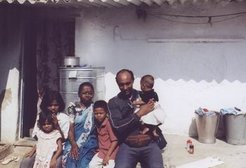
When we hear of the African Diaspora we tend to think solely of Africans in America and Europe. This is partially so because researchers who had studied the case dealt on the African immigrants to the western world without being aware of or paying due attention to the Oriental African Diaspora. Until very recently, only few studies dealt with Africans living in the Indian sub-continent and Asia. Unless the African communities living in other parts of the globe are equally represented in the literature we will not have the full picture of the African Diaspora. The few sublime works about African Indians that are worth of mentioning are that of the German ethnologist, Helene Basu, Muthana’s and Richard Pankhurst’s. Basu’s PhD dissertation and several articles provide considerable information particularly on the Siddi of Gujarat. I.M. Muthana, in his Indo-Ethiopian Relations for Centuries, published in 1956, has dealt extensively on the historical interconnections of the two countries and the subsequent immigration of many Ethiopians to India. Richard Pankhurst has written several study papers since the 1970s on the history of Indians of Ethiopian origin. Other works that are worth of consultation include Islam’s Black Slaves (2001) by Ronald Segal and Watson’s Asian and African Systems of Slavery (1980).
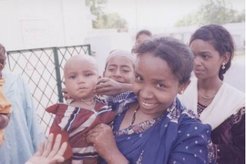
Much of the available literature on slavery discusses the experience of African slaves in the western world. Despite some exceptions, slavery in oriental societies has figured only marginally in comparative studies of slavery. In fact, very little has been said about African slaves in the Orient. This research attempts to give the account of the other side of the coin, without which a comprehensive observation of the whole picture is not possible. “The study of slavery and slave trade has become one of the fastest growing areas of academic research into the economic and social history of the ‘Third World’ but the Eastern slave trade has not received its due share of attention” (Toledano 1998:155). Toledano’s Slavery and Abolition in the Ottoman Middle East (1998) and Scarr’s Slaving and Slavery in the Indian Ocean (1998) are two of the most important works in this area.
With the advance of modern technology and science and with their continuous globalising effect even upon those who once were said to be closed societies, the Siddi cannot remain untouched. They are continuously loosing their cultural heritage and year by year swamped in the waves of modernisation. The Siddi of yesterday were not the same as the Siddi of today. And today’s Siddi will not remain the same. So, it is up to us, ethnologists and cultural anthropologists, to record such cultural lore before it is gone once and for all. Therefore, as I said earlier, the main objective of this study is to describe the people and their traditions.
An Afro-Indian Community in Karnataka, India: A Study of Ethnic Identity, its Maintenance and Change
Furthermore, this study aims not only to depict but also to analyse the Siddi identity. It observes how the Siddi feel about themselves and discusses their social universe in an attempted “emic” perspective. It shows how the Siddi identity is kept and cherished by the members, and how and why it is changing despite the presence of boundaries to safeguard it. Based on the findings of the research it may be able to reasonably forecast the future trend of the Siddi identity change. The Siddi social world is as dynamic as any other societies’ of India. Globalisation is continuously knocking at their doors and has even entered their houses. Based on the available findings, it is possible to cautiously anticipate the direction in which the Siddi are moving.
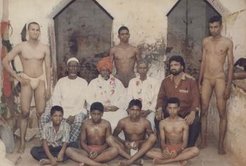
I will attempt to trace the geographic origin of the Karnataka Siddi based on a thorough investigation of their culture and some remains of African languages which are still in use among the community. I will also try to clarify some theoretical misconceptions and confusions on the concept of ethnicity and slavery. Besides, some misreading or misinterpretations of local terms that dramatically altered conceptual conclusions shall be amended.
It is my desire to show the plight of the African Diaspora in the Orient. I believe that the ethnologist should, to some extent, voice the concern of the people he/she is dealing with to the outside world. This is more so when one studies a people who have gone through many kinds of inhuman atrocities, including slavery, and left alone by their “masters” to the care of no one after they had served what was required of them. I shall attempt to produce, to the best of my capacity, a valuable document for implementation of development activities or further research in the area.
Moreover, it is possible to see and discuss the socio-cultural impact of the Siddi upon the host society because “the story of migration is not only about the people who migrate but also about the lands to which they go and their impacts on those lands” (Sowell 1996:2).
References
Basu, Helene (1995) Habshi- Sklaven, Sidi Fakire, Muslimische Heiligenverehrung im Westlichen Indien. Berlin: Das Arabische Buch
Muthanna, I.M. (1956) Indo-Ethiopian Relations for Centuries. Addis Ababa: Artistic Printing Press
Pankhurst, Richard (1972) The History of Ethiopia’s Relations with India Prior to the Nineteenth Century. Paper presented to the Fourth International Conference of Ethiopian Studies. Rome
Scarr, Deryck (1998) Slaving and Slavery in the Indian Ocean. New York: St. Martin’s Press, Inc.
Segal, Ronald (1995) The Black Diaspora. London: Faber and Faber
Sowel, Thomas (1996) Migrations and Cultures. New York: Basic Books
Toledano, R. Ehud (1998) Slavery and Abolition in the Ottoman Middle East. Seattle: University of Washington Press
Watson, L. James (ed.) (1980) "Slavery as an Institution, Open and Closed Systems". In: Asian and African Systems of Slavery. Oxford: Basil Blackwell




